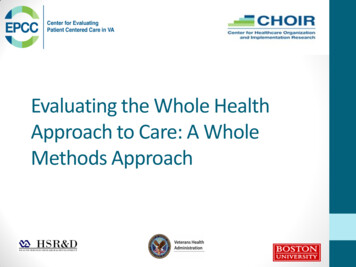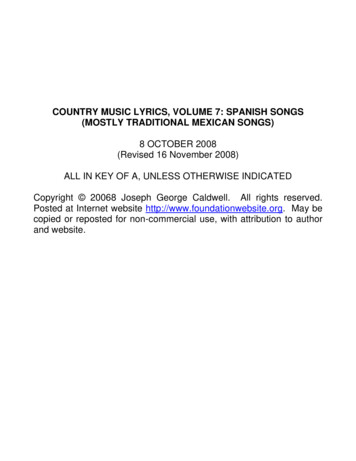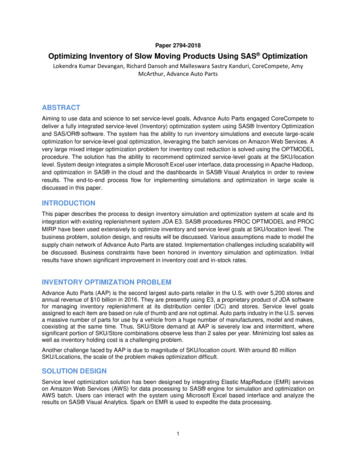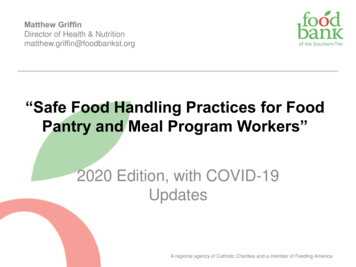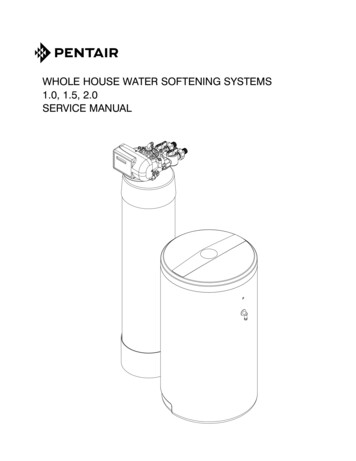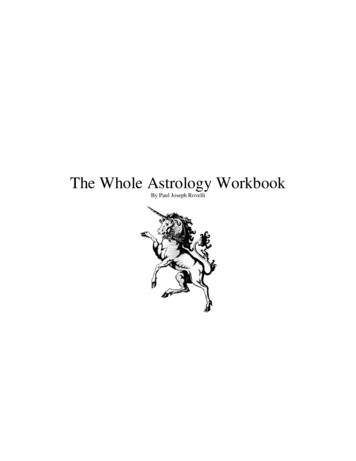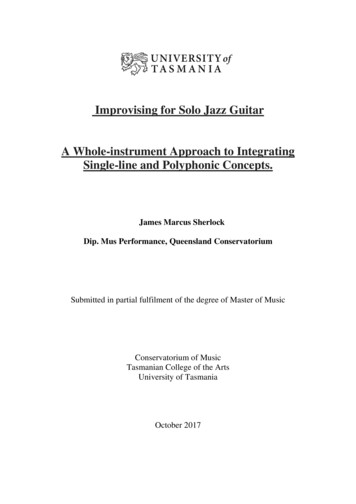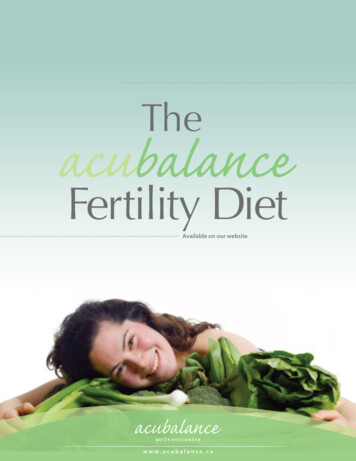
Transcription
We have put a lot of energy and resources into creating the Acubalance Fertility DietPlan. Its inspiration came from years of counseling couples in our clinic on how toeat to optimize their fertility.While Chinese physicians have been treating infertility with diet for centuries,Western science is just starting to catch up to the significant role that diet plays inthe ovulatory causes of infertility. A landmark study published in 2008, based on theHarvard Nurses Study, makes startling connections between diet and conception. Asthe most comprehensive research to date on diet and fertility, this study associates aslow carb, whole food, mostly plant based diet with a six-foldincrease in fertility.The Acubalance Fertility Diet Plan is an effort to blend the wisdom of Chinesemedicine with groundbreaking western research to help women and couples learnwhat and how to eat to optimize fertility. The diet includes meal plans, recipes,shopping lists, and tips on mindful eating to help you get started.- Lorne Brown B.Sc, DR.TCM, FABORM (Acubalance Clinical Director and ----TABLE OF CONTENTSIntroductionChapter 1: Fertility Diet & RecommendationsChapter 2: The Fertility Food GuideChapter 3: Fine-Tuning for Special ConditionsChapter 4: Getting Ready for ChangeChapter 5: Shopping for Fertility Friendly FoodsChapter 6: Let's Get CookingChapter 7: Recipes
Let food be your medicine andmedicine be your food. HippocratesFertility is the ability to fully inhabit a moment, to be completely present. That iswhere life happens—and that is the creative force of the mother. When we canlearn how to connect consciously with what is happening in each moment,however painful, allowing and trusting the unfolding of life on life’s terms—ratherthan controlling and forcing outcomes—we more simply open, to life. Robin Tiberi,DAOM, L.Ac, Clinical Director The Fertile SoulINTRODUCTIONThe Fertility Diet is the brainchild of Acubalance. It has come from years of clinicobservation and we have seen it work time and time again.While Chinese physicians have been treating infertility with diet for centuries, Westernscience is just starting to catch up to the significant role that diet plays in the ovulatorycauses of infertility. A landmark study published in 2008, based on the Harvard NursesStudy, makes startling connections between diet and conception. As the mostcomprehensive research to date on diet and fertility, this study associates a slow carb,whole food, mostly plant based diet with a six-fold increase in fertility.The Fertility Diet is an effort to blend the wisdom of Chinese medicine withgroundbreaking western research to help women and couples learn what and how to eatto optimize fertility. The diet includes meal plans, recipes, shopping lists, and tips onmindful eating to help you get started.Three Steps to getting started:MOVE, NURTURE,AND CONNECT
Move your bodyExercise. Move your body. When you exercise, your body rewards you by releasing a cascadeof feel-good hormones (endorphins). These endorphins are Mother Nature’s antidepressants,lowering your stress and boosting your sense of well-being.And to boot, exercise burns calories and helps regulate your insulin levels, reversing some ofthe metabolic imbalances that are contributing to your weight gain and your fertility issues.Just walking for 30 minutes every day has a positive effect. You can also make an effort toincorporate more activity into your daily routine by parking your car a few blocks from yourdestination, taking stairs instead of an elevator, or hiring a trainer.NurtureYou can’t be positive or give to others if your own basket isn’t full and you are feelingdepleted. So the first thing to do is put yourself on your agenda. Take time to nurture yourself:read an inspiring book, have a massage, go to the spa, keep a journal, garden, pamperyourself with a bubble bath with candles and music, or have a walk in nature. Take time eachday to meditate and connect to what’s important to you and what you have to be gratefulabout.ConnectHumans are social beings, and studies have shown that having a supportive community offamily and friends is the most important determinant of mental and physical health.Malcolm Gladwell tells a fascinating story in his book The Outliers . He describes a small towncalled Rosetta in the US that had been settled by immigrants from a village in Italy. The town isrenowned for the health and longevity of its inhabitants. Residents of Rosetta areastonishingly immune to the normal North American diseases like heart disease and cancer.Researchers were at a loss to explain this phenomena as they could find nothing different inthe diet or genetics of Rosseta compared to other towns in the region.Finally, they identified the differentiating factor—the community itself. Three generations offamilies often lived together. Everyone knew their neighbors and people felt safe andsupported. Whenever a family or individual was in difficulty, neighbors ralliedtogether to take care of them. The researcher finally concluded that it was thisculture of caring for each other that was the source of the remarkablehealth of the residents.More and more studies are showing that feeling connected is a potentelixir of health—lowering blood pressure, boosting your immunesystem and creating feelings of happiness and well-being.
Start combining all three: Move, Nurture & Connect by going for a walk in nature withfamily or friends at least once a week, and then come home for a tasty lunch or dinnermade from some of the recipes we have in this book. I bet you will feel great!Contemporary research and ancient practice both demonstrarte that healthy eatingfor fertility is based on a natural, whole foods, plant based, anti-inflammatory diet thatincludes the following:Whole FoodsWhole foods are minimally processed and refined as little as possible before being eaten.Whole foods provide maximum nutrients, fiber, enzymes, antioxidants and taste withoutadded artificial flavors, colors, preservatives, sweeteners or trans fats. Whole foods aresimple, local, unrefined foods, where processing is limited to enhancing digestibility(soaking, fermenting) or to food preservation such as canning, smoking, curing anddrying.Slow CarbsSlow carbohydrates are a group of carbohydrates that are slowly digested causing aslower and lower rise in blood sugar after being eaten. They include beans, peas, lentils,whole grains and most vegetables. Eating slow carbs help to minimize insulin resistance,regulate blood sugar, improve fertility and prevent gestational diabetes.Plant Based FoodsPlant based foods include a rainbow of high fiber, high antioxidant fruits and vegetables,legumes, nuts, seeds and whole grains. A plant based diet means that most (but notnecessarily all) of the diet is based on plant foods and is associated with healthpromotion, disease prevention and longevity around the world. It may be vegan,vegetarian or include small amounts of meat, fish, poultry, eggs and dairy.High Antioxidant FoodsHigh antioxidant fruits, vegetables, herbs and spices help to decrease oxidative stress andcellular inflammation associated with decreased fertility. Organic produce has beenshown to be higher in antioxidants.Healthy FatsHealthy fats and oils are pressed (slow, low temperature & unrefined - free of chemicalsolvents) expressed naturally from whole plant foods (coconuts, nuts, seeds, avocado,olives) and found in wild, deep sea, short-lived fish. Healthy fats combat cellularinflammation, and improve hormonal sensitivity.High Quality DairySmall amounts of full fat (non-homogenized) dairy products – particularly live cultureplain yogurt and kefir, and high quality artisan (naturally fermented) organic cheese – asthese are associated with increased fertility.
Healthy WeightWeight balance, through attention to balanced diet, portion size, daily exercise andmindful eating is key. Weight balance for optimal fertility includes a healthy body massindex (BMI) between 20 and 25 and a waist circumference (WC) of less than 35” for womenand less than 40” for men.Mindful EatingMindful eating as a way of eating that can help you slow down and tune in to your body,mind and spirit. It offers a daily way to practice mindfulness (paying attention, onpurpose, in the present moment, without judgment), which has been shown to be helpfulto manage stress, blood sugar, blood pressure, anxiety, depression and unbalanced ordisordered eating.Chapter ----------------------------------------FERTILITY DIET &RECOMMENDATIONSThe most comprehensive study to date looking at diet and fertility is the Harvard Nurses’Health Study that followed over 18,000 women in a long-term research project looking atthe effects of diet and other factors on the development of chronic disease. Chavarro andWillett looked at the fertility data from this study in The Fertility Diet (2008). During thestudy, each woman was trying to have a baby. Over eight years of follow-up, the studyfound that most did get pregnant. However, one in six women encountered some problemsgetting pregnant. The results were incredible – even to the researchers – who found a sixfold increase in fertility in people who ate a certain diet and maintained a certain lifestyle.Specifically, the study found that women who had the lowest risk of ovulation problemrelated infertility (or the highest fertility) ate a plant based, low GI, whole foods diet focusingmore on vegetable protein and monounsaturated fats. Women with the highest fertilityexercised more, took a multivitamin mineral supplement and ate at least one serving ofhigh fat dairy each day. CarbohydratesFatsProteinsDairy ProductsVitamins & Minerals Body Weight Environmental Toxins Cellular Inflammation & Fertility
CarbohydratesThe study found that the type of carbohydrates you eat has a significant influence onfertility. It found that diets high in refined and easily digested carbohydrates increased theodds of ovulatory infertility. Fast carbohydrates (high GI foods) bring a quick influx ofglucose into the blood stream which then leads to a rapid rise in insulin. This is oftenassociated with a quick energy high followed by a depressing low.Fast carbs include foods made with white flour and refined sugar, russet potatoes, alcohol,candy, cookies, pastries, doughnuts, chips, and sodas. On the other hand, diets that wererich in high fiber, slow carbohydrates (low GI foods) were associated with improved fertility.Low GI foods include whole grains, brown rice, legumes, and vegetables. This lines up nicelywith work showing that a diet rich in these slow carbs and fiber before pregnancy helpsprevent gestational diabetes, an increasingly common problem for pregnant women andtheir babies.Carbohydrates are the primary determinant of blood sugar and insulin levels. Fats andprotein are digested slowly and do not have much impact on blood sugar by themselves.When blood sugar and insulin levels rise too high, they disrupt ovulation. In fact, the studyfound that the amount of carbohydrates in the diet was just as important as the type.Women whose diet contained at least 60% of its calories from slow carbohydrates tended tobe a healthier weight than women who generally avoided carbs altogether. The slow carbeaters tended to have an overall healthier lifestyle including more exercise, less alcohol andcoffee, less fat and animal protein and more plant protein.What is insulin resistance?Insulin resistance refers to the body’s reduced capacity to metabolize insulin andglucose. The pancreas works harder and harder to produce insulin, but the insulincannot do its work of transporting glucose (sugar) into the cells because of ahormonal imbalance or because a person is overweight. The excess insulin in theblood leads to excess glucose in the blood and contributes to prediabetes, weight gainand diabesityWhat is diabesity?Diabesity refers to Type 2 diabetes caused by obesity and insulin resistance.What is the glycemic index?The glycemic index (GI) is a measure of how high the blood sugar rises after eating afood. The foods are ranked on a scale, using white table sugar as a comparison(ranked as 100). Low GI foods cause a lower rise in blood sugar after a meal,creating longer satiety, less blood sugar swings and sustained energy. Research ispointing to a connection between low GI foods and increased physical performance,better weight management, prevention and treatment of diabetes and moodstability.
Fertility Diet Recommendations:You can improve ovulation with a diet based on at least 60% of calories from slow releasecarbohydrates such as whole grains, dried beans and peas, vegetables and whole fruits. Eatmostly low and medium GI foods, and avoid those foods with a high GI.Examples of GI of Common FoodsLow GI 55 or lessSprouted grain bread/tortillasSweet potatoOat bran, Pumpernickel or Buckwheat breadAl dente (firm) pastaLentils/kidney/ChickpeasQuinoa, bulgur, barleyBran Buds with Psyllium Fruits and vegetablesWhole milkYogurtMedium GI 56 – 69Potato (new or red)OatsPopcornSplit pea or green pea soupBrown riceCouscousBasmati riceShredded Wheat cerealWhole grain breadRye bread/Ryvita crackersHigh GI 70 or moreInstant mashed potatoesPotato, baking (russet)White and Instant riceWhole wheat flour breadPancakes, wafflesMost breakfast cerealsBagelSoda crackersCandy/popFrench friesEnergy barsSports drinksMost granola bars
The GI of a meal can be lowered by adding: lemon juice or vinegar (add broccoli with lemon juice or a salad with dressing to ameal with high or medium GI foods i.e. brown rice)healthy fats like olive oil, walnut oil or organic buttermixing low GI food with a medium/high GI food (eg beans and brown basmati rice)Here are some examples: Breakfast: free-range eggs, sprouted whole grain toast or steel cut oatmeal with nutsand blueberriesLunch: salmon on sprouted tortilla, salad with oil and lemon juiceDinner: bean or vegetable chili over browm rice, fresh whole fruit saladFor a complete listing of the glycemic index of more foods, see www.glycemicindex.com .Don’t get too lost in the glycemic index. The important part is to focus on eating morelegumes, whole grains and vegetables in place of fruit, juice or processed grains (breads,muffins, cakes, cookies).What are Whole Grains?Whole grains are plant foods that include all parts of the grain kernel: the bran,germ and endosperm. Whole grains contain the most nutrients including B vitamins,magnesium, chromium and fiber. They take longer to cook but are worth it for theirflavor, texture and nutrition. These are the best source of complex ‘slow’carbohydrates as they are high in fiber, enzymes, antioxidants, vitamins andminerals. Eat a few servings of whole grains every day, depending on your energyrequirements.Refined grains are whole grains that have been processed to remove part of thebran, germ or endosperm. The more a whole grain is refined during processing, themore nutrients are lost. Some are partly refined like whole wheat flour, bulgur andcouscous. These can be eaten occasionally, however should be avoided by womenwith PCOS and/or if you are trying to lose weight.Processed grains have been totally refined or processed to the point where there isvery little nutrition left (white rice, white flour). Some refined grains have hadnutrients added back to them after processing (enriched white bread). Avoid thesefoods while you are following the Fertility Diet.PCOS clients should restrict the amount of flour products they eat. Sprouted wheator grains are a better choice as even whole wheat flour is processed and quicklydigested and can cause rapid increase in blood sugar. To slow down the rate thatfoods made with flour are absorbed you can combine them with healthy fats (likealmond or peanut butter) or protein.True whole grains are: barley, large oats, brown rice, amaranth, quinoa, millet,wheat berries, spelt berries and kamut berries.
FatsThe Nurses' Health Study looked for connections between dietary fats and fertility from anumber of different angles. Among the 18,555 women in the study, the total amount of fat,cholesterol, saturated fat, or monounsaturated fats in the diet wasn't connected withovulatory infertility.What they did find, however, was the largest decline in fertility in women who ate trans fats.Trans fats are artificial fats that cause damage to cells and contribute to inflammation anddisease. Findings from the Nurses' Health Study indicate that trans fats are a powerfuldeterrent to ovulation and conception. Eating less of this artificial fat can improve fertilityand can also mean an increase in healthful unsaturated fats, which can boost fertility evenfurther. The largest decline in fertility among the nurses was seen when trans fats wereeaten instead of monounsaturated fats.What are trans fats?Trans fats are synthetic fats made by hydrogenation of oils. Trans fats causeinflammation in the body, thus decreasing immune function and increasing plaquebuild up in the arteries. The National Academy of Sciences recommends that there isno safe level of trans fats, however the average North American consumesapproximately 22 gm of trans fats each day through processed, packaged foods andfast food restaurants. You can minimize your intake of trans fats by avoiding foodswith hydrogenated or partially hydrogenated fats or shortening on the list ofingredients and minimizing your intake of fast and processed foods.What are monounsaturated fats?Monounsaturated fats are associated with promoting healthy cardiovascularfunction. They are found in natural foods such as olive oil, nuts and seeds and theirbutters as well as avocados.Fertility Diet Recommendation:Choose oils that are cold-pressed, virgin and/or UNREFINED from the plants or seedsthat they originate. The process preserves/protects the nutritional value of the oilwithout using high heat &/or adding harsh chemicals. Be aware of oils that areindustrially processed & chemically treated to extract the oils from seeds. The resultis less exposure to free radicals/toxins and less damage to cellular metabolism.*Avoid oils with labels using the term expeller-pressed, as it still designates that theoil has been industrially processed or expeller-pressed using friction heat & isdamaged. All Unsaturated Seeds are VERY fragile and easily damaged by heat(anything over 35 degrees), light & O2.Use these Oils for Dressings or Garnishes (Cold use only); Cold-pressed Extra-Virgin Olive Oil Unrefined Sesame Oil Cold-pressed Flaxseed or Hempseed Oil Unrefined or Cold-pressed Black Currant, Avocado or Hazelnut.
Include Omega-3 Fats (small amount with each meal); Deep sea short lived fish (such as mackerel, sardines, salmon, and halibut) Walnuts Hempseeds, hempseed butter or hemp oil Olives or cold-pressed olive oil Flaxseed meal or Flax seed oil Salba seeds.What is Salba?Salba is an ancient grain belonging to the mint family called Chia. It is an excellentwhole food source of omega-3, fiber and protein. For optimum nutritional benefits,grind Salba before using. Salba is best freshly ground sprinkled on fresh food orcooked in baked goods like muffins, pancakes and cookies.Saturated FatsYou can eat small amounts of saturated fats from pasture raised meat. Studies have shownthat exclusively grass fed animals have significant levels of Omega 3 fatty acids.Orgnaic butter is another healthful fat.Margarine is not recommended. Even if the margarine is made with ‘good oils’ and is nonhydrogenated, it tends to have artificial ingredients. Nut and seed butters are excellent aswell as nutritious spreads such as hummus, pesto and tapenade.Avoid buying foods containing hydrogenated fats, partially hydrogenated fats, shorteningor that have mono or diglycerides on the list of ingredients. Remember--the most importantelement of the Fertile Diet is to eat WHOLE foods One way you know you are eating a wholefood is that it does not have a list of ingredients!ProteinsFindings from the Nurses' Health Study indicate that getting more protein from plants andless from animals is an important step towards optimizing your fertility.Women in the study with the highest protein intake (115 g/day) were 41 percent more likelyto have reported problems with ovulatory infertility than women in the lowest-proteingroup (77g/day). However, when the type of protein was looked at (animal versus plant)protein, an interesting distinction appeared. Ovulatory infertility was 39 percent more likelyin women with the highest intake of animal protein than in those with the lowest. Thereverse was also true – women with the highest intake of plant protein were substantiallyless likely to have had ovulatory infertility than women with the lowest plant protein intake.Fertility Diet Recommendations:These results point the way to another strategy for overcoming ovulatory infertility – eatmore protein from plants (beans, peas, lentils, nuts, seeds) and less from animals (meat,poultry, eggs, and dairy). Contrary to old ways of thinking about protein quality, plantproteins are actually an excellent source of high fiber protein.
Plant protein:LegumesLegumes (beans, peas, lentils) are plant proteins that are rich in fiber, iron and B vitamins.Eat legumes every day either for lunch or dinner. Add them to soups or salads, make theminto dips, or cook up a batch of chili or a bean casserole. Keep your cupboards stocked witha variety of canned and dried beans.SoyTraditional soy foods like tofu, tempeh, tamari and miso are a nutritious protein and can beeaten as part of a balanced diet a few times a week. Balance is the key. People in Asia havebeen eating tofu, tempeh and miso for hundreds of years--in moderate amounts. In thewest, however, we consume large qualities of processed soy products in soy milk, soyprotein powders, soy “meat”products, and soy fillers. The result is that we are eating muchlarger quantities of soy that has ever been consumed in a traditional Asian diet. As well, weare eating a highly processed food product rather than a whole food. Increasingly studiesare showing that adulterated foods (like trans fats) have unintended health consequences.ConclusionWhole food soy products like miso, tempeh and spouted soybeans are healthy if eaten a fewtimes a week in small amounts. If you eat tofu you should choose organic tofu Dailyconsumption of processed soy products may have a negative impact on your fertility.What is soy?Soy products are made from soy beans.Tofu is fresh soy bean curd, which is a quick to prepare source of protein that takeson the flavor of whatever you are cooking.Natto is fermented soybeans. Miso, tempeh, and seiten are fermented soybeanproducts that have a similar taste and texture to cooked chicken.Nuts and SeedsNuts and seeds are a great source of quick concentrated protein and good fats. Limit yourdaily intake to no more than one ounce (about 20 nuts) and choose natural organicproducts. For variety, try almond butter, cashew butter, and hazelnut butter in addition tonatural peanut butter. Toss a tablespoon of ground flax seed on your oatmeal each morning.Try pumpkin seed butter, sunflower seed butter or hemp seed butter on your toast insteadof butter or margarine.
Animal ProteinSmall amounts of organic animal protein can be part of a healthful fertility diet. If youchoose to eat red meats, choose grass or pasture fed meat. Keep your serving size to nomore than the size of the palm of your hand.Organic turkey and chicken are great sources of lean protein, especially when eaten withoutthe skin.Organic eggs are an easy to digest inexpensive source of high quality protein. You can enjoy3 – 5 eggs a week, even if your cholesterol is high. Don’t forget about eggs for a quick highprotein dinner!Short lived, deep fish such as mackerel, trout, herring, sardines and wild salmon are all richin omega-3 fatty acids shown to support healthy cells and immune function, manageweight and hormone balance and reduce pain associated with endometriosis.Mercury in FishHow do we follow advice to eat seafood twice a week without getting too muchmercury and other toxins? Mercury is a neurotoxin, which can damage a developingbrain. Fish that is high mercury tends to be larger fish such as tuna, swordfish,shark, marlin, orange roughy, and escolar. Limit your intake of these fish. Insteadchoose short lived deep sea Pacific fish such as wild salmon, mackerel, sardines andhalibut. Choose only high quality supplements that are from ‘safer’ fish.Safe Fish?Check the Environmental Defense Fund website for a review of the safest and mostsustainable fish choices for your health ( www.edf.org )DairyThe Harvard Nurses' Health Study found that women who ate low fat dairy products wereless likely to get pregnant. The study showed that eating full fat dairy products, on the otherhand, was associated with an increased chance of getting pregnant. This led researchers torecommend that if women are including dairy in their diet they should consume moderateamounts of whole fat rather than low fat dairy products.However, if you have a Chinese diagnosis of “phlegm damp” or have endometriosis, youshould eliminate dairy from your diet completely. Some research has shown that dairyproducts may increase prostaglandins, which stimulate estrogen. Estrogen is responsible forcommon endometrial symptoms such as painful menstrual cramps, as well as menorrhagia(heavy menses), diarrhea, nausea and vomiting. In Chinese Medicine, dairy products arethought to create a dampness (mucous) that interferes with the flow of energy through thebody, creating stagnation.
Talk to your Chinese medicine practitioner aboutwhether dairy is right for you.Fertile Diet Recommendations:Enjoy one serving of whole fat dairy (1/2 cup yogurt, whole milk or 1/2 oz cheese) if that fitsyour Chinese medicine constitution. Keep in mind that the studies have shown that eating awhole food, mostly plant based diet is the best recipe for fertility. So limit animal proteinsincluding dairy and focus on including a rainbow of fruits and vegetable in your diet everyday.You can substitute milk or cream in your coffee, tea, cereal, or baking with unsweetened,fortified, rice, oat, hemp or almond beverages.Incorporate calcium rich foods into your diet as outlined in The Fertility Food Guide.Take a calcium supplement if you aren’t able to manage getting 1000 mg/day from yourdiet (i.e. 6 – 8 servings from The Fertility Food Guide). Choose calcium citrate with addedmagnesium and vitamin D.However, if you eat a whole food, mostly plant based diet you should be able to absorbenough calcium from your diet.VitaminsHigh quality food is always the best source of nutrients. Supplements can be useful in finetuning a healthy diet and providing extra support for fertility. Supplementation is based onthe individual, depending on your diet, lifestyle, and health goals.Multi-Vitamin/MineralsThe Nurses’ Health Study found that women who took a multivitamin mineral supplementat least six days a week had a higher fertility rate. Prenatal multivitamin mineralsupplements are generally recommended for women trying to conceive. They contain 0.4 to1.0 mg of folic acid, a B vitamin that is involved in central nervous system development ofthe early fetus.IronA high iron intake of at least 40 gm/day is associated with increased fertility. The currentrecommended daily intake (RDI) for iron is 13 gm/day for women of childbearing age. Mostprenatal supplements contain iron, but they also contain calcium. Each inhibits theabsorption of the other, so we usually recommend an iron-free prenatal taken inconjunction with, but not at the same time of day as, an additional liquid iron supplement.We particularly like Floradix Iron and Herbs.
Iron in FoodsHigh iron foods include naturally dried fruit, chickpeas, adzuki beans, lentils,quinoa, kale, broccoli, molasses and organic red meats. You can boost your intake ofdietary iron by using iron fortified foods such as enriched grain products (forexample a high fiber enriched Bran cereal with a low GI).Absorption of IronHelp you body absorb iron by eating vitamin C rich foods at the same time as vegetable sourcesof iron. Use foods that are leavened, sprouted, soaked, fermented and roasted to increase thebioavailability of the iron. Use cast iron and stainless steel ote:Supplements for men should not contain extra iron because studies have shown alink between supplemental iron intake and heart disease in um 200 mcg/daySelenium is a trace mineral that protects cells from oxidative damage. It is also needed foriodine metabolism and a healthy thyroid. Selenium is found widely in plant foods,depending on the quality of the soil. Brazil nuts, eggs and oatmeal are some of the bestsources of selenium in the diet. The recommended daily intake is 55 mcg/day. Selenium isoften found as part of an antioxidant formula.B12 (cobalamin)B12 supplementation is strongly recommended for people following a vegan diet. B12 isavailable through brewers yeast, which can be sprinkled on food, or through a supplementof 2.6 mcg/day.Vitamin D – 1000 IU/dayRecent research links Vitamin D to cancer prevention and a supplement of 1000IU/dayis recommended for all adults.Fertility Diet Recommendations:The Fertility Diet Supplement ProtocolWomen:Prenatal Multivitamin/mineral Folic Acid 1mg/day CoQ10 100mg/day (if over 35 yrs) Greens: wheat grass 2 shots/day,or, spirulina 3000mg/day
Omega-3 2000mg/dayVitamin D 1000 IU/day Men: Multivitamin/mineral (Iron Free)AntioxidantsOmega-3 2000mg/dayVitamin D 1000 IU/dayZinc
slow carb, whole food, mostly plant based diet with a six-fold increase in fertility. The Acubalance Fertility Diet Plan is an effort to blend the wisdom of Chinese medicine with groundbreaking western research to help women and couples learn what and how to eat to optimize fertility
